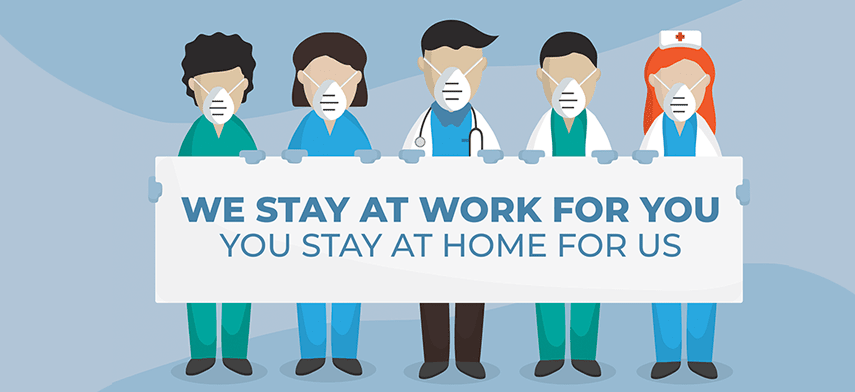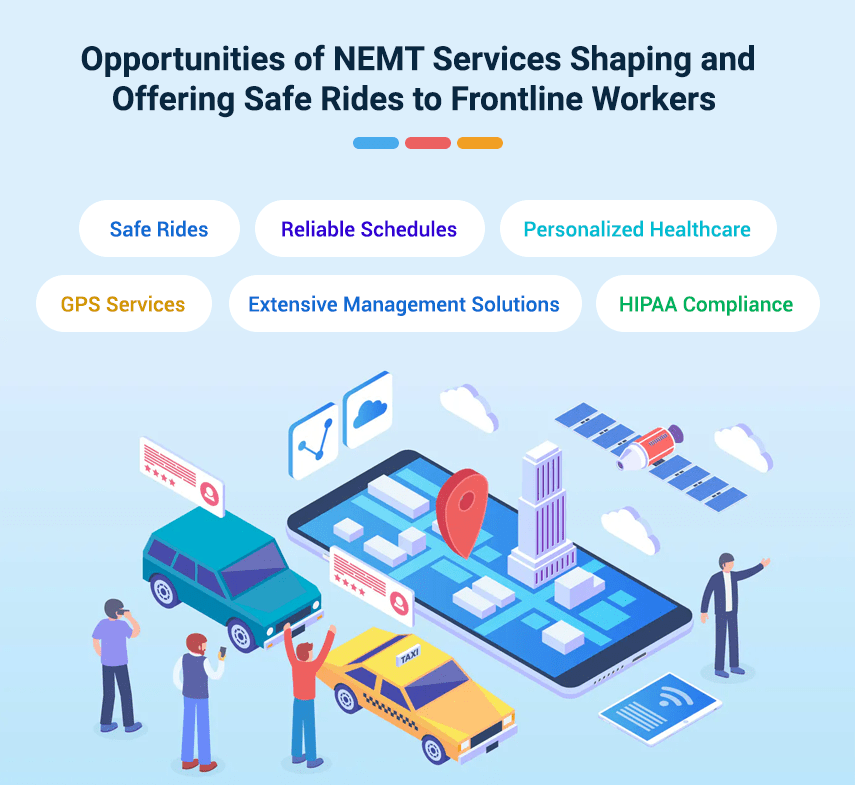Now that the world is finally coming out of the clutches of the COVID-19 pandemic, a resemblance of normalcy has resurfaced, and workers have started commuting to offices again. But despite the lowering of Covid-19 cases and hot zones, back and forth commute to workplaces is rendering employees prone to acquiring the virus.

Whether by using public transport, carpools, private vehicles, or ride-hailing, employees are braving the pandemic each day and reporting for their work shifts. Frontline workers such as healthcare workers, crime investigators, fire patrol, etc. who provide the significant workforce for necessary jobs are at an increased risk as they trek each day to save lives. Consequently, their lives are put at risk. The companies associated with non-emergency medical transportation services are working hard to provide safe transport to the frontline workers.
The Challenges Faced by Frontline Workers in Availing Transportation Services during COVID-19
Paying for commute
Now that almost all work sectors and offices are reopening, people are searching for work again. Hence, they can earn after a long spell of the COVID-19, when the economy suffered scarce resources. Several people had to be very trivial in how much they spent, especially if they had to pay for the COVID-19 treatment fee. Therefore, medical transportation service helps commute back to work in a private vehicle or even a public transport means providing a meager but challenging pay for fares or gas, especially if the workers were not earning previously.
Availing transport
The threat of COVID-19 is yet to be eliminated. Thus, most transportation services have not resumed reliable commute schedules, and several areas are still not being provided with regular buses, taxis, and other modes of transport. Workers are finding it difficult to avail different means of transportation or even hail a cab. People have to walk more distance than in the pre- COVID-19 era to catch buses headed for their destination. This poses a specific threat as extra public exposure and also workers have to spend more time commuting to work.
Matching commute schedules
Even if the workers can secure a means of commute to work, the frequent changes in programs due to sudden corona outbreaks, authorities need to switch up commute timings or make a change in the route of the bus or train without much of a warning. Because the threat of the virus is still looming globally, workers worldwide are struggling to come up with a fixed schedule for their commute. Also, this results in a constant rush, which in public places at the time of a pandemic is seriously dangerous.
Keeping safety in crowded places
While all the thoughtful and concerned citizens worldwide are entirely okay with wearing masks in public places, a select few never understood the dire need and are still putting themselves and others at risk. As frontline workers, who have to interact with various people in the term of their work, are subjected to this, not only is their safety put at risk but also of all those who contact them. Apart from wearing masks, public transportation is not very mindful of social distancing and healthy habits such as using sanitizers.
Braving long routes and traffic
As train and bus routes are shifted to avoid coronavirus-affected places, individual commutes to work are taking longer than usual, which means increased time in public transport, cabs, or even a private vehicle. The time is then reduced from the worker's free hours, which is the only time they could care for themselves.
Additionally, more and more people choose health transportation services to work in self-owned vehicles resulting in a steep rise in traffic. Hence, workers find themselves to be stuck in traffic longer than usual. The long commute time adds to the stress and, of course, decreased health and productivity.
Opportunities of NEMT Services that Shaped and Offered Safe Rides to Frontline Workers

Safe rides
Accessing public transportation in the middle of a pandemic can be a terrifying task. But, thanks to the non-emergency medical transportation services, health workers can access safe rides with minimum fare. In fact, in some cases, essential health workers are also provided free rides to reach locations with patients in dire need. These rides are safe as the medical transportation service vehicles are disinfected after each ride, and there is a plastic barrier to separate the driver from the passengers.
Reliable schedules
Because the rides are personally booked and paid for, with the additional benefit of checking the location of the nearest vehicle and booking it, healthcare workers can stay assured that they have a reliable mode of transportation for commuting to work and other areas. Hence, all patients can be accessed at a time, and workers can save countless lives due to the health transportation services.
Personalized Healthcare
A critical opportunity made available to health workers in the COVID-19 era using healthcare transportation services is to create a loyal customer base from their access locations. Adding customized logos, brand name tags, and other such badges to bringing a wholly furnished UX can increase brand awareness and how many people turn to those brands in times of need.
GPS Services
One key factor critical to all healthcare professional's work is to reach the patient's location at any time. But with COVID-19 and increased traffic, this can be a difficult task. However, as the NEMT digital dispatch system aims to digitalize the whole process, workers can easily find the passengers' locations and reach them at a time. On the other hand, patients can also use these digitized services and book a medical transportation service vehicle nearest to them.
Extensive management solutions
Not only do the Non-emergency medical transportation services excel in vehicles and medical equipment, but they also provide complete, extensive control over the management of data, routes, schedules, and help scale concerning the medicinal organization. Because Covid has led to a surge of patients worldwide, the Medical transportation service and data management help maintain statistics, information, biodatas, and more.
HIPAA compliance
Non-emergency medical transportation aids in accessing a complete technology-driven solution for the Covid travel challenges. Now, especially as health workers are making use of the health transportation services and an abundance of patients benefit from this, keeping the patients' data secure is essential. Non-emergency medical transportation services have provided the solution to this by bringing the HIPAA compliance. This is used to edit, share, access, and securely record the data electronically and maintain the PHI.
A few notable transportation network companies providing NEMT services and have included these in their work models are Lyft and Uber. Though both of these companies had initiated these services back in 2016 and 2018 and were NEMT transportation providers, the pandemic highlighted its real importance. These NEMT transportation providers helped patients reach health appointments on time, and they missed fewer appointments. Besides, it also helps patients to remain independent with the day-to-day living that matters to them such as grocery shopping, pharmacy visits, community events, and visiting their family.
Hence, as public transportation was made scarce in the pandemic owing to its non-availability and increased public exposure, NEMT service providers helped both patients and health workers commute safely. Several organizations are now providing free rides to frontline workers and ensure all steps for complete passenger safety.

The Impact of Ridesharing and NEMT Services Post COVID-19
The use of public transit in the US went down to approximately 80% during the beginning of the pandemic. Urban transit has reduced in many cities worldwide, but people like primary care providers or frontline workers like nurses and doctors found difficulty in transporting. The healthcare and transportation companies are partnering with NEMT service providers to enable safe traveling for frontline workers.
In contrast, with the recent NEMT patterns of utilization, it was shown that telehealth is experiencing significant growth in utilization as a result of COVID-19. The data analysis given by the Guide House Center for Healthcare Insight stated that 92% of healthcare providers had increased their use of telehealth as they have received a large amount of capital investment.
The increase in telehealth investment and utilization is one of the leading indicators of the significant changes in how healthcare consumers behave and are likely to reshape the healthcare industry's landscape. Suppose the early indicators are an accurate representation of the rise and growth of telehealth in the US. In that case, there is a possibility that it may disrupt the healthcare industry, and non-emergency medical transportation services are likely to suffer.
Wrapping Up,
The actual perspective is an essential asset to leverage when you face unexpected financial outcomes, especially for the healthcare industry during COVID-19. The insights are most likely to help structure and optimize the risk mitigation strategies for the programs that face capitation arrangement-related risks. Even though COVID-19 is a challenge to the non-emergency medical transportation services and healthcare, the industry is quickly adopting it as a matter of necessity. The industry has been trying hard to provide safe rides to the frontline workers. Proper planning and strategizing will help implement appropriate risk mitigation solutions, help with NEMT programs, and avoid financial risks. It will also help to position them for the successful future of NEMT care even after COVID-19.
Author's Bio

